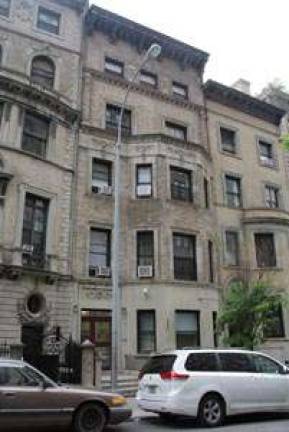Uptown Illegal Hotel Shut Down by City

Last week, another illegal hotel operating on the Upper West Side bit the dust as the city steps up enforcement of recent state laws prohibiting them. The hotel in question is not really a hotel at all, by law or by appearances. It's run out of 318 W. 75th St., a landmarked five-story walk-up with 11 apartment units. It looks like, and is zoned to be, a residential building, but until recently, four of the 11 units were functioning as hotel rooms instead of homes. Until a few days ago, the four rooms were listed on the travel site Airbnb.com, where homeowners can rent out rooms or entire homes to travelers at rates typically lower than traditional hotels. The listings have since been taken down, but they boasted a prime Upper West Side location and spacious, sunny apartments. Visitors had been coming and going among the permanent tenants for some time, but the city was finally spurred to action when the local block association got involved. "West 75th Street has had this on their radar for a while," said Dee Rieber, president of the block association. "It was pretty clear that people were coming and going with suitcases for quite a while. We didn't know the extent, that there were four homes in the building that were being used as illegal hotels, until relatively recently." Rieber said that the owner of the building, Ron Shoshany, has been trying to get tenants out of the rest of the building in order to operate all of the apartments as hotel units. Shoshany, the president of Sirkin Realty on East 62nd Street, did not return a call requesting comment for this story. But the photos that last week were advertising apartment 1A at 318 W. 75th St. as an available property on Airbnb are now on Sirkin Realty's website advertising the same apartment, fully furnished, for rent. "It's been very difficult for the tenants in the building, I know that, just from what's happened in the past two weeks," Rieber said. After Rieber mobilized the block association and the local elected officials, making 311 complaints, the Mayor's Office of Special Enforcement moved quickly to inspect the premises and issue violations against the building operating transient occupancy rooms out of a permanent residence. The Department of Buildings inspected and issued Environmental Control Board violations, which address the occupancy contrary to the zoning and certificate of occupancy as well as the lack of fire exits and sprinkler systems that are required for hotels. The listings have disappeared and Rieber believes, based on what she's heard from tenants, that for now the temporary occupants are out. Sarah Meier-Zimbler, who works as a legislative aide to State Sen. Tom Duane, said their office has been trying to combat illegal hotels, or the technical term "transient use occupancy establishments," for years. She told residents in an email that calling 311 was the best way to register the issue with the city, but that it can be a slow process. She also pointed out that even when fines are levied, they are often low enough that the owner simply pays them and continues to operate illegally, making more than enough money to cover the financial risks. Similar studio apartments in the neighborhood rent out on Airbnb for $150 to $200 a night; if the apartment is rented most nights, it brings the owner more money than the average studio would in monthly rent. Council Member Gale Brewer is sponsoring legislation in the City Council that would raise the fines for illegal hotel operators, which she said has gotten support from affordable housing advocates, neighborhood groups, lawmakers and even legitimate hotel operators. "The current amount [of the fine], if you have an illegal hotel, is very low, under $1,000. That's like one night of business," said Brewer. "The feeling is if you're really going to have some teeth to the state law, the fines really need to be higher."